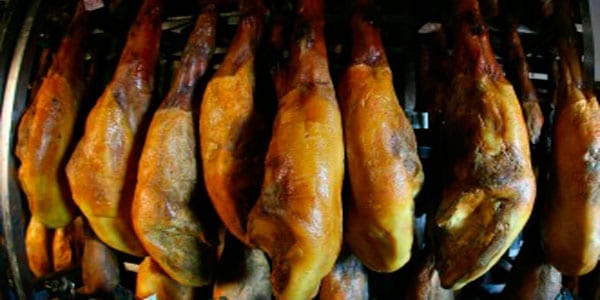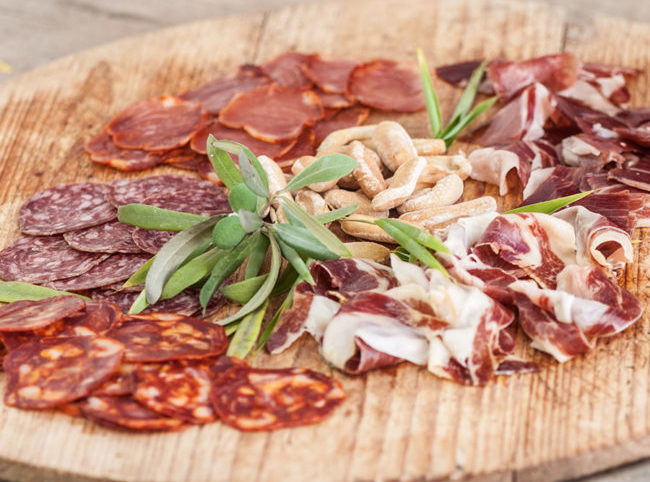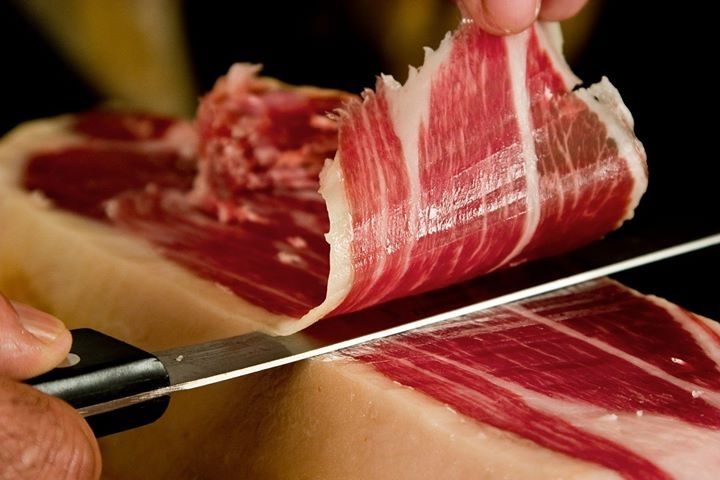
Many news appear about the certification of the Iberian pig, on the validity of the standard and who should manage it. As well as the interests of the industry for wanting to fully exploit the brand Iberian. How far has this eagerness to industrialize a product that is hardly 'industrializable' taken?
But perhaps the most serious thing is that these events are deteriorating the Iberian brand inside and out of Spain. Thus leading the consumer to confusion and maximum lack of confidence. This is because the standard allows to use the same Iberian brand in genetically different animals. With different feeding and different breeding or curing methods.
The Iberian brand in this German report
In this article we echo the report published on May 21 in the German newspaper SÜEDDEUTSCHE ZEITUNG and the impact this information may have on the German consumer. We have spoken with some of those affected about the damage that the rule is causing. As well as the current commercial impact it is having on international consumers and distributors.
In the report, its author, Thomas Urban, rigorously details the standard in force regarding the Iberian pig. Doing a review of their upbringing, race, genetics and diet. Below we provide some excerpts from the article published.
“Royal Decree 4/2014, –which regulates the manufacture of Iberian ham-, allows all the pieces of ham to be marketed under the commercial and racial name of Iberico. Even if they come from crossbred and mass-produced animals »
«The regulation establishes three categories based on the purity of the animals used in the crosses. 100% Iberian, 75% Iberian (second generation cross between an Iberian female and a hybrid male) and finally the 50% Iberian. This is the result of the first generation of crossing between an Iberian dam and a Duroc stallion »
The detractors maintain that the regulation of Brussels regarding the strict procedures applicable to all hybrid pigs. In addition, through this official approval, clearly damaging the breed and the Iberian brand. Since they firmly believe that the name of an officially recognized breed can only be assigned to animals of that pure breed.
"They are not 100% genetically pure Iberian"
"The miscegenation of the race was legalized 16 years ago, so the detractors speak that it is taking place and allowing" legal fraud to the consumer "
"In other words, it is estimated that four fifths of the females classified as pure Iberian (4 out of 5) go to the herd book through the auxiliary section and it is believed that they are not 100% genetically pure"
Currently around 3 million pigs are slaughtered annually and all are officially registered as Iberian. But less than 10% are genetically pure. So the defenders of the authentic Iberian ham are outraged. When checking how more than 90% of the pieces sold as Iberian breed do not correspond to what is supposed to be the best ham in the world.
Chemicals to replace fatty acids in acorns
In the University of Cordoba they have detected that there is an incessant and serious fraud. They explain that high-quality acorn-fed ham would have to go through molecular analysis. That which reliably guarantees the presence of the authentic fatty acids provided by the acorn-based diet.
If the minimum parameters are not met, the "acorn" quality and guarantee seal could not be used, according to these experts.
But researchers from animal feed companies have developed substances that mimic the fatty acids in acorns. These chemicals are incorporated into cheap animal feed.
Two people's reactions
The article was the most read in the digital edition of the newspaper the weekend after its publication with the consequent impact on social networks. Several German radios showed interest in the subject. According to its author, there have been two reactions: one of disappointment and disappointment, the other of acceptance. At least, within the context of the Spanish crisis that is creating a change in perception of the Spanish reputation that was traditionally very good.
Recognizing that a single publication cannot have a great impact on the German consumer. Urban it does acknowledge that the public good gourmet food who spends money on a product of excellent quality likes to be informed of it.
The position of Señorío de Montanera
Francis Asparagus, company manager Manor of Montanera, also interviewed by the aforementioned German media, transmitted to Great Products your concern about the damage and confusion this is causing in the Japanese market.
“In Iberian meat, we have lost 50% of sales in Japan, where they have gone overboard due to the mistrust and confusion created. This is going to come to the Ham in a couple of years "
Asked about the market France and Great Britain, recognizes that although there is confusion, they value more the traceability that their company gives them.
Currently, the regulations allow this type of pig to be fattened before slaughter in wooded enclosures and with one pig per hectare. But it also authorizes its bait in plots with a livestock load of one hundred animals per hectare. Where there is not a single blade of grass and the trees are dead.
According to Asparagus, this last productive option “is perfect for large industrial corporations that destroy large tracts of land in this way. As this type of final fattening in the open air is carried out with feed and in farms that, in general, do not have sewage systems. Wastewater from animal excreta pollutes the soil. '
Other opinions of producers
Other producers comment that although they are concerned about the issue, they have not noticed anything special in the sales. Nor have they been asked for any explanation by international distributors. They do tell us about some falsifications of labels that they report in European countries and especially in China.
For its part, Juan Luis Ortiz Perez, technical secretary of the Denomination of Origin of the Producers of Los Pedroches, insists that the main problem is one of control, as the German newspaper pointed out.
“The classification of the quality of the ham It is certified by private control bodies. It is paid for by the operators themselves and the large industrial corporations. Those who dominate the majority of the market »
Ortiz highlights that the rule came to solve a problem and this has made it even worse.
One of their claims is that certification should be in the hands of state entities. John Louis Ortiz add in the article:
"This" opaque and fraud-prone "system favors large industrial corporations that were originally specialized in the mass rearing and fattening of white-coat pigs and that have switched to producing cross-bred Iberian pigs in intensive systems, because they offer higher profit margins "
As Ortiz tells us, the question is whether it will be possible to recover the prestige that is being lost day by day in the national and international market. So return it to the place where the name of the Iberian.






